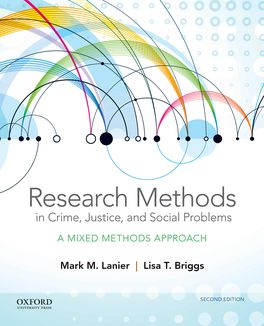Research Methods in Crime, Justice and Social Problems

Research Methods in Crime, Justice and Social Problems
|
ISBN: |
9780190694432 |
|
Binding: |
Paperback |
|
Published: |
12 Jul 2018 |
|
Availability: |
|
|
Series: |
$193.95 AUD
$221.99 NZD
Add To Cart Request an inspection copyDescription
Intuitive, accessible, and filled with real-world testimonials from criminal justice scholars, Research Methods in Criminal Justice and Criminology: A Mixed Methods Approach, second edition, gives students the tools they need to understand the research they read and take the first steps toward producing compelling research projects themselves. Featuring a step-by-step organization that follows the stages of a research project, it emphasizes the actual experience of conducting research and includes a wealth of examples. The text is enhanced by robust pedagogy including chapter objectives, key terms, a running glossary, and chapter-ending discussion questions.
New to This Edition:
- An expanded discussion of ethics, including revised examples in several different chapters
- Examples, applications, and exercises from other academic disciplines, including social work and sociology
- A greater focus on mixed methods research
- A new chapter on qualitative data analysis (Chapter 10), which includes an overview of how new technology has dramatically altered data collection and analysis
This title is available as an eBook. Visit VitalSource for more information or to purchase.
Contents
Preface
Chapter 1. Why Research at All?
The History of Research
Good, Yet Critical, Science
Research Distinctions
Critical Thinking Exercises
Chapter 2. The Stages of Research: A General Overview
Step One: Selecting a Research Topic
Step Two: Identifying a Testable Research Question
Step Three: Finding Research
Step Four: The Literature Review
Step Five: Research Design
Step Six: Data Collection and Variable Coding
Step Seven: Data Analysis
Step Eight: Reporting of Results
Step Nine: Conclusion and Limitations
Final Suggestions
Critical Thinking Exercises
Chapter 3. Research Ethics
The Quest for a Perfect Study
Common Ethical Principles
Human Research Protection Program
Institutional Review Boards
Ethical Guidelines
Other Ethical Notes
The (Ever-Increasing) Role of the IRB
Ethically Questionable Studies
Final Thoughts
Critical Thinking Exercises
Chapter 4. Validity and Reliability: Threats to Research Integrity
Validity and Reliability
Types of Validity
Other Research Threats
Critical Thinking Exercises
Chapter 5. Qualitative Research Strategies
Historical Synopsis of Qualitative Research
Requisite Qualitative Research Tools
Field Research
Other Types of Qualitative Research
Factors Influencing the Qualitative Data Collection Process
Summary
Critical Thinking Exercises
Chapter 6. Research Designs and Survey Research
Operationalization and Coding
Composite Measures
Choosing a Research Design
Experimental Research
Experimental, Quasi-Experimental, and Pre-Experimental Designs
Other Research Strategies
Survey Research
Summary
Critical Thinking Exercises
Chapter 7. Mixed Methods
Illustrations of Mixed Methods
Mixed Methods for Program Evaluation
Steps to Mixed Methods Research
Critical Summary of the Mixed Methods Approach
Summary
Critical Thinking Exercises
Chapter 8. Sampling Strategies
Probability or Nonprobability Samples?
Critical Thinking Exercises
Chapter 9. Elementary and Intermediate Quantitative Data Analysis
Basic Quantitative Analysis
Univariate and Descriptive Statistics
Intermediate Data Handling: Bivariate and Multivariate Statistical Analysis
Bivariate Statistics
Frequency Distributions
Multivariate Statistics
Summary
Discussion Questions
Chapter 10. Qualitative Data Analysis
Critique of Causality
Traditional Qualitative Analysis
Contemporary Statistical Qualitative Analysis
Mixed Methods Analysis
Critical Thinking Exercises
Chapter 11. Beyond Research: An Aid to Writing Success
Plagiarism
Publication Manual of the American Psychological Association (APA)
Effective Writing Practices
Becoming a More Professional Writer
Writing Tip Summation
Critical Thinking Exercises
Glossary
References
Index
Authors
Mark M. Lanier – Professor of Criminal Justice, University of Alabama.
Lisa T. Briggs – Associate Professor of Criminal Justice and Criminology, Western Carolina University.
Reviews
"This is the definitive text for a research methods course, at either the undergraduate or graduate level, mostly due to its multidisciplinary emphasis and mixed methods approach to research. The comprehensive coverage of each topic, the repetition that reinforces learning throughout the text, and the ancillaries also add significant value." -- Judith Kirwan Kelley, Curry College
"Research Methods in Criminal Justice and Criminology is the most approachable research methods text that I have ever read. It also covers the qualitative and quantitative divide quite well." -- Thomas Dearden, High Point University
"I use this book for two reasons: 1.) It is written in a style that is fun and 'easy' to read, accessible for students, and engaging. 2.) It is inexpensive and lightweight. Students can afford to buy it." -- Amy Smoyer, Southern Connecticut State University